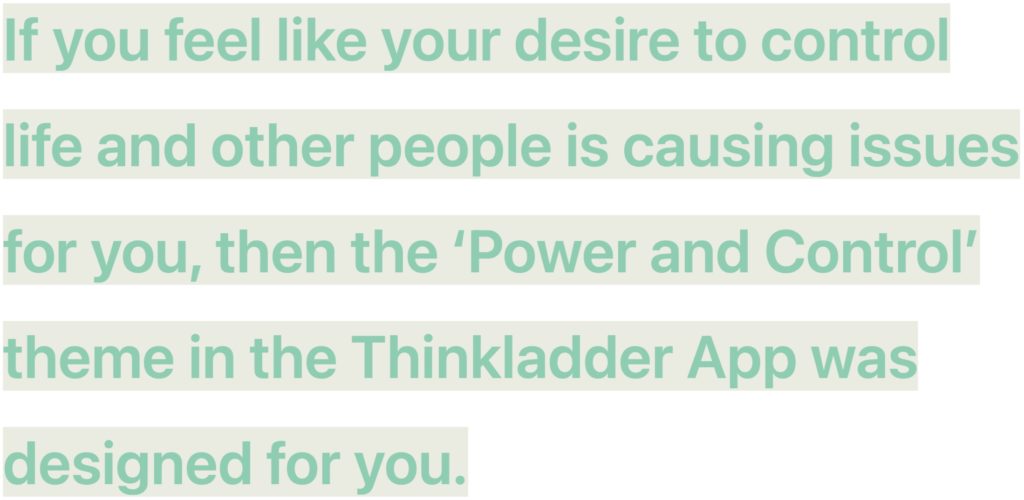Try out the ‘Power & Control’ Theme in the Thinkladder app here:
It’s not an easy thing to admit that we, as humans, have a tendency towards trying to control people and situations. The need to exert power and control (over life or people) has roots in our past experiences and often stems from a deep sense of powerlessness. If we leave our controlling behaviours unaddressed, they can create havoc in almost every area of our lives. But there’s hope! If we’re willing to do the work, we can begin to heal. We can discover a sense of peaceful surrender that ripples through our internal and external worlds.
A great place to start working on this issue is by reflecting on the limiting beliefs that feed into our controlling ways. These might be something like, ‘Being unable to control life is dangerous’, or, ‘Acceptance and surrender are a sign of weakness’. Once we have identified these beliefs, we are then able to challenge them with insights that support our quest to let go.
If you feel like your desire to control life and other people is causing issues for you, then the ‘Power and Control’ theme in the Thinkladder App was designed for you.
Insights from the ‘Power & Control’ Theme
Being in control is a feeling that I have learned to associate with feeling safe in the world; as I slowly release my fingers from this death-grip, I will begin to understand that my safety in this world has little to do with my ability to control life.
Practical tips to help you navigate the need for power and control:
Acceptance and surrender: Certain things in life are beyond your scope of influence. Often, trying to control an outcome only adds stress and frustration. Acceptance of this reality can alleviate the need for excessive control. Empower yourself by redirecting your focus towards what you can control, such as your actions and responses. Embrace the concept of surrendering to the flow of life and accepting things as they are.
Cultivate trust: Build trust in yourself and others. Trust that you have the skills and capabilities to handle whatever comes your way. Developing a sense of trust (in yourself and those around you) can reduce the need for excessive control.
Embrace flexibility and adaptability: Life is unpredictable. Unexpected changes and challenges are inevitable and require flexibility. Cultivating adaptability allows you to navigate changes without rigidity.
Delegate and collaborate: Despite what your subconscious beliefs may tell you, you don’t have to do everything on your own. Delegate tasks and encourage collaboration or input from others. Cooperative approaches foster a sense of teamwork and empowerment, shifting you away from the urge to control.
Don’t forget the basics:
Practise mindfulness: Engage in mindfulness practices such as meditation, deep breathing, or journalling. These practices can help you become more present and aware of the current moment. Mindfulness allows you to detach from the need to control and embrace a more accepting and open mindset.
Enjoy the process: Often, the need to control comes from a sense of anxiety about the end outcome. By shifting our focus towards embracing the journey, we can reduce anxiety, increase enjoyment, and loosen our grip on the need to be in control.
Seek support if needed: If the need to control becomes overwhelming or interferes with your well-being and relationships, consider seeking support from a mental health professional . They can provide guidance, strategies, and a safe space to explore and address the underlying causes of the need for control.
Develop self-awareness: Explore your thoughts and feelings. Thinkladder can help you discover what subconscious beliefs may be fuelling a need to be in control. Discover uplifting insights to empower an intentional shift towards peace and acceptance.
Related topics: People Pleasing, Self-Worth, Anxiety & Comparing Myself To Others.


